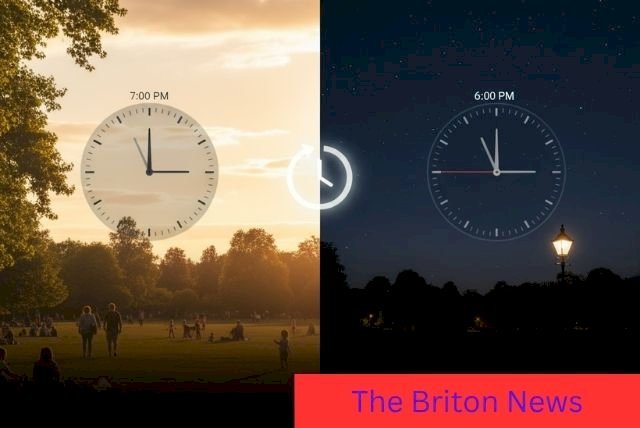British Summer Time Ends: When to Change Your Clocks in October 2025
Clocks go back in the UK on 26 October 2025 as British Summer Time ends. Learn why the UK changes clocks, what time it happens, and how it affects daily life and sleep.

Clocks across the UK will go back one hour at 2:00 a.m. on Sunday, 26 October 2025, marking the end of British Summer Time (BST) and the country’s return to Greenwich Mean Time (GMT).
This annual time change brings brighter mornings, darker evenings, and one extra hour of sleep.
When to Change Your Clocks
The UK clock change 2025 will occur in the early hours of Sunday, 26 October. At exactly 2:00 a.m. BST, the clocks will move back one hour to 1:00 a.m. GMT.
This marks the official end of British Summer Time 2025, the period when clocks are set one hour ahead of standard time to make better use of daylight during summer months.
Smartphones, computers, and digital devices will adjust automatically. However, traditional wall clocks, oven timers, and car dashboards may require manual resetting.
The shift follows the well-known reminder:
“Spring forward, fall back.”
Clocks go forward in March and back in October every year.
Why the UK Observes British Summer Time
The idea of British Summer Time was first introduced in 1916, inspired by builder William Willett, who believed adjusting clocks could extend evening daylight and conserve energy.
Since then, daylight saving time in the UK has been observed from late March to late October. It was initially adopted to save fuel and resources during wartime, encouraging people to spend more hours outdoors in daylight.
During World War II, Britain experimented with “British Double Summer Time,” advancing the clock by two hours in summer and one hour in winter. The measure helped productivity but was dropped post-war.
Today, British Summer Time remains a seasonal adjustment that aligns the UK with much of Europe. Despite occasional debate about scrapping clock changes, the UK government continues the tradition for consistency in trade, travel, and scheduling.
How the Time Change Affects Daily Life
When the clocks go back UK 2025, the shift to GMT will be felt almost immediately. Mornings will become lighter earlier, while evenings will get darker sooner.
For many people, this change brings mixed emotions — some enjoy the extra hour of rest, while others feel the shorter evenings mark the approach of winter.
Public services, businesses, and schools prepare in advance to avoid disruption. National Rail, Transport for London (TfL), and airlines automatically update their timetables, but travellers are always advised to double-check schedules, especially for early morning trips.
For shift workers, the clock change can mean an additional hour on night duty. Meanwhile, morning commuters enjoy a short period of brighter starts before winter darkness settles in again.
Retailers and entertainment venues often see changes in consumer behaviour too, as more people choose indoor activities once the evenings turn dark earlier.
Energy and Environmental Debate
One of the earliest goals of daylight saving time was energy conservation — reducing the need for artificial lighting by extending natural daylight hours.
In the modern era, the impact is less clear. Studies show that while energy use for lighting may decrease slightly, demand for heating during darker months can rise. Experts argue the overall environmental effect is minimal.
Nevertheless, the UK continues to follow the same pattern as its European neighbours, keeping energy efficiency and daylight alignment in mind. The discussion about whether to end the practice resurfaces occasionally, but no formal plans exist to change the current system.
The Health and Mood Connection
Health experts say the October 2025 time change can affect sleep, mood, and productivity, at least temporarily.
According to the British Sleep Society, moving the clock back by one hour can disrupt the body’s circadian rhythm, or internal clock. This may lead to mild tiredness or irritability during the adjustment period, even though people technically gain an hour of rest.
The shorter daylight hours also play a role in mental well-being. With evenings turning darker earlier, some individuals may experience Seasonal Affective Disorder (SAD) — a type of low mood linked to reduced sunlight.
Experts recommend maintaining consistent sleep routines, seeking morning sunlight, and staying active during the day to counter these effects. Simple habits, such as outdoor walks or light exercise, can help the body adjust naturally to the seasonal transition.
Public and Social Media Response
Every year, the end of British Summer Time sparks widespread conversation across social media.
On platforms like X (formerly Twitter), Facebook, and Instagram, users share reminders, humorous memes, and nostalgic posts marking the arrival of darker evenings. Many express gratitude for the extra hour of rest, while others lament the early sunsets.
In northern parts of the UK, where daylight hours are shorter in winter, residents often express frustration with the rapid onset of darkness. Meanwhile, those in southern regions tend to adjust more easily due to slightly longer daylight spans.
Media outlets, including BBC News and ITV, traditionally run reminders throughout the week leading up to the UK clock change, helping citizens stay on schedule and avoid confusion.
Energy Use, Safety, and Daily Routines
Beyond lifestyle and social impact, the clocks going back has practical effects. Road safety experts note a seasonal rise in evening accidents as visibility drops earlier, urging motorists and pedestrians to remain cautious.
Energy providers monitor consumption closely during the transition, as patterns shift between morning and evening peaks. While lighting use typically drops slightly, heating and evening electricity demand often rise in cooler months.
For households, the end of British Summer Time 2025 is also a cue to prepare for colder weather — adjusting thermostats, checking heating systems, and switching to winter routines.
What to Expect Next (March 2026)
After the October 26 2025 time change, the UK will remain on Greenwich Mean Time (GMT) through the winter months.
The next shift will occur when British Summer Time begins again on Sunday, 29 March 2026, at 1:00 a.m., when clocks move forward one hour to 2:00 a.m. BST.
This annual cycle — springing forward and falling back — has become a familiar rhythm of British life, marking the passage of seasons as reliably as the weather itself.
Until then, Britons can look forward to cozy evenings, glowing streetlights, and that small but welcome extra hour of sleep. For many, it’s a reminder that time — just like the seasons — always finds a way to reset.
Closing Reflection
The end of British Summer Time 2025 is more than a technical clock adjustment. It’s a national moment that blends history, science, and everyday life — connecting millions of people through one shared shift in time.
As the clocks turn back on Sunday, 26 October 2025, the UK will once again step into longer nights and colder mornings, ready for the months ahead.
Did you remember to change your clocks?
Share how the UK daylight saving time affects your daily routine — only on Briton News, your trusted source for national updates, lifestyle stories, and seasonal features.
FAQs — British Summer Time Ends 2025
1. When do the clocks go back in the UK in 2025?
The clocks in the UK will go back one hour on Sunday, 26 October 2025 at 2:00 a.m.
This marks the end of British Summer Time (BST) and the country’s return to Greenwich Mean Time (GMT).
2. Do I gain or lose an hour when British Summer Time ends?
When the clocks go back, you gain an extra hour of sleep.
At 2:00 a.m. BST, the time moves back to 1:00 a.m., effectively repeating the hour.
3. Why does the UK still change clocks every year?
The UK observes British Summer Time to make better use of daylight during summer.
The tradition, started in 1916, helps extend daylight hours in the evening and aligns with European daylight saving systems.
4. Will my phone change automatically when clocks go back?
Yes. Most modern devices — such as smartphones, tablets, computers, and smartwatches — automatically update the time based on network settings.
You’ll only need to manually adjust analog clocks, ovens, or car dashboards.
5. Does the time change affect trains, buses, or flights?
Transport systems like National Rail, Transport for London (TfL), and airlines automatically adjust their schedules to reflect the time change.
Passengers travelling early on 26 October 2025 should check updated departure times to avoid confusion.
6. How does the clock change affect sleep and mood?
According to the British Sleep Society, time changes can temporarily affect sleep patterns and mood.
Experts recommend maintaining a consistent bedtime and getting morning sunlight exposure to help your body adjust naturally.
7. When will British Summer Time start again in 2026?
British Summer Time will begin again on Sunday, 29 March 2026, when clocks go forward one hour at 1:00 a.m. GMT.
That’s when the UK will move from GMT back to BST, welcoming longer and brighter days.
8. Is British Summer Time the same as Daylight Saving Time?
Yes — British Summer Time (BST) is the UK’s version of daylight saving time.
It refers to the period when clocks are moved forward by one hour to make the most of natural daylight during summer.
9. How does the UK clock change compare with Europe?
Most European countries also change their clocks on the same weekend as the UK — the last Sunday in October for ending DST, and the last Sunday in March for starting it.
This synchronisation helps coordinate business, transport, and trade across the region.
10. What’s the purpose of moving the clocks back?
The main purpose is to save daylight and better match daylight hours with people’s active hours.
It was originally introduced to reduce energy use and make evenings lighter during summer months.

















